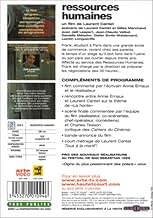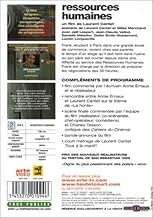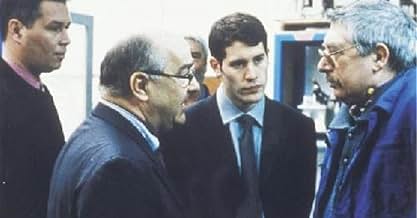अपनी भाषा में प्लॉट जोड़ेंThe 35-hour work week has all of France in its thrall. This film turns it into a feature about economic and familial politics. Frank, a business school graduate, returns to his provincial ho... सभी पढ़ेंThe 35-hour work week has all of France in its thrall. This film turns it into a feature about economic and familial politics. Frank, a business school graduate, returns to his provincial hometown to take a management position in the factory where his father has been working for ... सभी पढ़ेंThe 35-hour work week has all of France in its thrall. This film turns it into a feature about economic and familial politics. Frank, a business school graduate, returns to his provincial hometown to take a management position in the factory where his father has been working for 30 years. First Frank makes the mistake of actually asking the workers on the assembly lin... सभी पढ़ें
- निर्देशक
- लेखक
- स्टार
- पुरस्कार
- 19 जीत और कुल 5 नामांकन
- Alain
- (as Didier Emile-Woldemard)
फ़ीचर्ड समीक्षाएं
There is a naturalness about the location, the setting and the pace that makes this film a refreshing change from Hollywood High Tech. It is well worth seeing.
First, the premise is very interesting. What happen with the family dynamics when the sons and daughters are more educated than their parents? Of course, that is only one aspect of this film's premise. Second, the scene where Franck is yelling at, and blaming, his father is absolutely heartrending. Only a stone wouldn't react to that masterful scene. Third, "entertaining" is hardly the word to describe Ressources Humaines, but I have to say that this film seemed much shorter than tired comedies like Charlie's Angels and Scary Movie.
(8/10) Highly recommended.
By Blake French:
The powerful, heartbreaking new French drama "Human Resources," written by Laurent Cantet and Gilles Marchand, is so authentic the only true professional actor in the cast is Jalil Lespert, who plays Franck, the son of a workaholic. The rest of the performers were chosen from unemployment organizations in regard to the business the characters would have to play. "The title "human resources" is first of all a reaction against the cynicism of that expression," explains director Laurent Cantet in an interview. "A human being is administered the same way you would administer stocks or capital." After watching this film we understand what he means by those words.
The working characters employed by a personnel division factory where Franck's dad is currently employed. He has been working there for thirty years and is happier when his son is emotionally further apart from him. Franck has defied his family heritage, went to college, and has recently returned to the French home where his parents live. He gets a job as a manager at the company in which his father works. This is where he becomes torn between business opportunities and staying loyal to his principles of fairness and morality. The people at the factory treat the workers like machines, and it is then when he understands "human resources" refers to people as variables in the production flow graphs.
Director Laurent Cantet is not from a working class family, as cleared up in a press kit, so these skillful and wise foreign filmmakers decided to get ideas confirmed by those who did live that life. The parts of the factory workers are played by actual workers; the boss is a real boss; the union leader is a real union leader. The film is also shot in an authentic working factory, as if a documentary was in the creation. Cantet was absolutely correct: who better to imitate the positions and postures of a worker's body bent over a factory machine, or especially the language itself, much of which was selected the workers themselves. The factory's supervisors are cutting back, and Franck gets the privilege of listening to the suggestions that a recent questionnaire asks. The questionnaire is to help make the employers, who are drained of most consciousness on the job, feel they are important to the success of the corporation. Then, while snooping around on the boss's computer, Franck finds the questionnaire is nothing but a pretense for upcoming layoffs, that of which his father is on the list. While Franck is furious at the deceptions, his father refuses to even go on strike after learning of his fate-he is simply to used to consistence and routine, he fears change.
The movie is more about the inner struggle between Franck and his father than the actual protesting by the employees or how the factory supervisors fight back. American movies are not often about factory workers, and when they are, the subject is more parody, like in "Officer Space" (1999), than class struggle. One of the best arguments this movie makes is that class struggle is still alive today, and has a high impact of various societies. There are other themes in "Human Resources": greed and power, communication between Franck and his family, the father-son association he has with his boss, finding one's place in society, and shame and regret.
"Human Resources" is of the most penetrating films of the year; it offers descriptive writing and empathizing characters. Shot in a documentary style, the direction is focused and sincere, and the performances are mesmerizing. The only thing keeping it from perfection is the somewhat slow-moving script that occasionally strays idle when some of the most important events take place. Beyond that, however, "Human Resources" is a must-see if you are a fan of original, reality theme-based dramas.
Franck (Jalil Lespert) is going to be graduating soon from college. So, for his internship, he returns to the factory where his dad has long worked and Franck's job is in the front office...with management. He has arrived at an interesting time, as the relationship between the owners and the workers are deadlocked. The boss insists he's got the workers' best interests at heart and the communist labor leader simply wants nothing to do with him and her position is purely adversarial. Most viewers likely will assume this labor leader is an extremist...and it sure looks that way. Franck decides to try appealing directly to the workers...and he's wildly successful. What he doesn't know is that the boss really IS a duplicitous creep and he's using Franck. So what will Franck do when he learns the truth?
This film is a tough sell for many viewers. A film about labor and management is NOT a sexy or exciting idea for most viewers. It also is very slow at times and features a direct-to-video look. Still, despite all this, it is a powerful and well acted film that gets you to think.
क्या आपको पता है
- ट्रिवियाSame script structure as Oliver Stone's "Wall Street".
- साउंडट्रैकQuatuor N°13 en la mineur
Composed by Franz Schubert
Performed by Melos Quartett (as Melos Quartet)
Published by Harmonia Mundi
टॉप पसंद
विवरण
- रिलीज़ की तारीख़
- कंट्री ऑफ़ ओरिजिन
- आधिकारिक साइट
- भाषा
- इस रूप में भी जाना जाता है
- Human Resources
- फ़िल्माने की जगहें
- उत्पादन कंपनियां
- IMDbPro पर और कंपनी क्रेडिट देखें
बॉक्स ऑफ़िस
- US और कनाडा में सकल
- $1,16,866
- US और कनाडा में पहले सप्ताह में कुल कमाई
- $29,526
- 17 सित॰ 2000
इस पेज में योगदान दें























